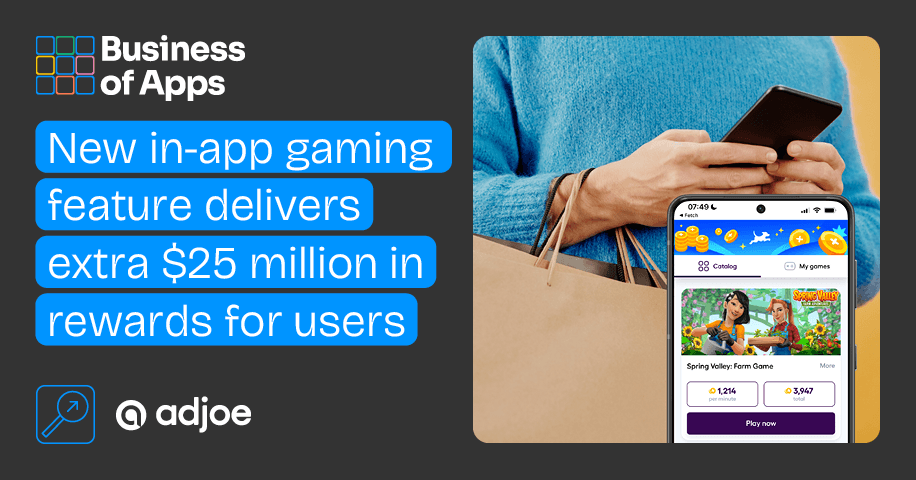Fetch is the biggest loyalty app in the US, with 11 million weekly active users and five million five-star reviews from happy Fetchers.
The company’s engagement strategy has for over a decade focused on upgrading customer loyalty as consumers upload their everyday in-store receipts in Fetch Rewards to earn Fetch Points. When they accumulate enough points, they can redeem these to save money on their favorite brands, such as Starbucks, Target, and Amazon.
The Fetch team decided to diversify its product portfolio, engage customers in a new way, and inject extra revenue streams into its app. The US-based company started working with us in December 2023 to integrate a premium play-to-earn mobile gaming solution into its app. The collaboration achieved unprecedented success within just days of the integration.
What happens when brands redefine app usage habits?
The new native gaming feature has captivated Fetch users at every stage of the life cycle – from loyal Fetchers to reactivated Fetchers, who started to re-engage with the app.
After integrating adjoe’s Arcade solution into its app, Fetch customers earned over ten billion points in Fetch Play – the equivalent to 25 million dollars in gift cards.
The Fetch team had further achievements to celebrate:
- 10% increase in customer lifetime value
- 5% uplift in app engagement
- 5+% MoM boost in app open rates
Fetchers were empowered by the app’s added optionality – after years of digitizing their receipts, they could earn Fetch Points by playing the world’s top-ranked mobile games. Fetch Play meets consumers where they are in their lives, at a time when budgets are tight. The gaming feature rewards them for what they’re already doing: using their phones and buying everyday items such as food or gas.
While these savings-savvy users usually need to justify spending time playing mobile games, they now find value in mobile gaming because it puts money straight back into their pockets. And savings have been staggering: to date, customers have already earned the equivalent of $25 million in gift cards.
But the almost-immediate success of Fetch Play didn’t eat into the success of the app’s original functionality – to transform receipts into rewards. Fetchers didn’t pivot from one product feature to another; those who earned more points daily by playing games continued to scan their receipts weekly. Their engagement and retention were greater than those who didn’t engage with Fetch Play.
Fetch Play’s transformative impact on the company’s overall revenue was the biggest talking point. The loyalty app’s team is now pitching its access to untapped gamers and high engagement metrics to gaming advertisers and brands, who are more likely to pay premium prices for this new connection. As Marc Bearman, General Manager of Gaming at Fetch Rewards, suggests, this audience “isn’t easy to activate outside of the Fetch ecosystem.”
🔍 Master Onboarding with JTBD & MaxDiff
Discover how to optimize your app’s onboarding process using the Jobs-to-be-Done framework and MaxDiff analysis.
Download nowWhat can we learn from this?
While Fetch Rewards’ journey started with rewarding consumers for what they buy and where they shop, Fetch Play enhanced this functionality by rewarding consumers for how they spend time on their phones.
Instead of assuming they don’t have a gaming audience, more non-gaming brands are now considering how they can bring their audience mobile games in a contextually relevant way to better connect with them. Fetch’s core demographic didn’t initially identify as gamers; however, engagement with Fetch Play has been high, and Fetchers have been excited to earn rewards outside the shopping experience.
The Fetch team is continuing to find ways of delivering greater value to both brands and Fetchers to consolidate its position as a top loyalty app that mobile game advertisers will want to collaborate with to win deeper connections with untapped and engaged gamers.
Find out more about adjoe’s Arcade solution for branded apps here.











